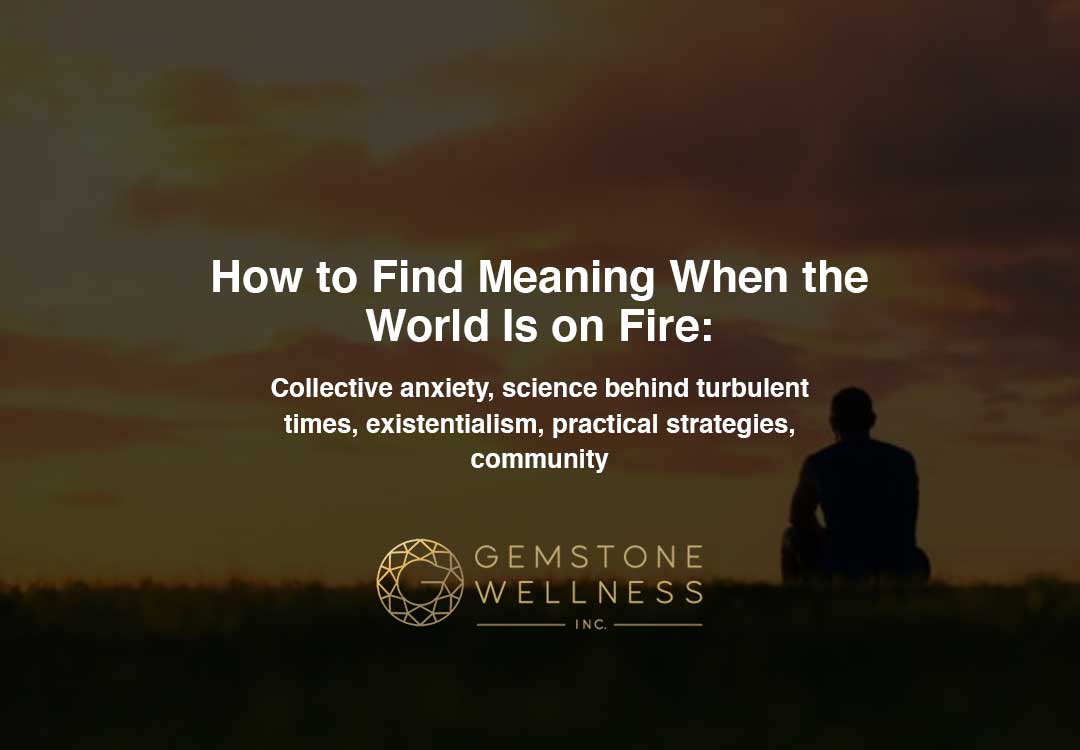Collective anxiety, science behind turbulent times, existentialism, practical strategies, community
By Stephanie Hernandez, LPC
“When we are no longer able to change a situation, we are challenged to change ourselves.” — Viktor Frankl
Introduction: There’s a notable shift in the air—our daily routines noticeably suppress the underlying unpredictability and collective anxiety. In our current world, it often feels like chaos reigns supreme. From ongoing political turmoil and global crises to personal struggles, the weight of these challenges can easily overwhelm and disorient us. As mental health therapists, we intimately empathize with this struggle. We navigate the same turbulent waters, working to find meaning amid the unpredictability and offering support to others while prioritizing our well-being. How do we find meaning when everything seems to be falling apart?
Understanding Collective Anxiety/Trauma
The term “collective trauma” describes the psychological effects of a traumatic experience on an entire community, influencing shared memory through continuous reconstruction. Events such as war, genocide, slavery, terrorism, and natural disasters can result in collective trauma, which encompasses historical, ancestral, or cultural aspects (Hirschberger G. (2018).
In today’s context, collective trauma and anxiety are increasingly relevant due to how connected we are through media and communications. The events happening globally today are quickly impacting individuals’ mental health on a massive scale; the noticeable shift in energy when in large crowds can result in feelings of fear, uncertainty, and helplessness. The constant exposure to news/media can amplify the tension felt worldwide, increase feelings of hopelessness, and even exacerbate these feelings. Recent research by the APA has highlighted major stressors in adults’ lives, with 68% citing concerns about the future of our nation and 61% expressing stress related to violence and crime. These worries closely follow concerns about U.S. debt (57%), mass shootings (56%), social divisiveness (55%), and health care (54%). These findings underscore the diverse and significant challenges that impact individuals’ mental well-being today.
The Science Behind Turbulent Times
Knowing the science behind turbulent times can offer understanding and insight into the mind-body connection and how we respond to stress and uncertainty. When experiencing stress or fear, we trigger a physiological reaction designed to protect us and implement immediate action with the fight-or-flight response. Prolonged exposure to the response can overwhelm our coping mechanisms, lead to chronic stress, and impact our mental and physical health. At the moment, our brain makes a quick decision based on sensory input and processing, which then sounds the alarm in the hypothalamus-warning our system of impending danger. Once activated it will notify two other parts in the brain of how to respond, with either fight or flight (short-term stress) or long-term stress; usually, the body will enter relaxation moment right after; however prolonged exposure to stress can create an abnormal reaction to a typical encounter, meaning your body is ready to respond quickly when its not in immediate danger (LeWine, H.E. (2024). It is a physiological reaction that can overwhelm our ability to cope effectively and counters the rest/relaxation effect. During unprecedented times, our brains may have a heightened stress response; this is a time to lean into slow moments, with nostalgia, and little things that inspire joy.
Existentialism: How to Find Meaning
Existentialism is a philosophy that emphasizes the idea that people have free will to determine the course of their lives. It underscores the crucial role of individual responsibility in creating meaning; existentialism can exist as a separate entity as well as within religion and spirituality; both can co-exist on the journey of finding meaning. The philosophy of existentialism itself, places the power and control of our lives squarely in our hands.
Suffering is a universal experience, and the inability to find meaning in it can be overwhelming. However, finding meaning in our suffering can provide us with strength during life’s most challenging moments. This insight from existentialism offers valuable guidance and support. Viktor Frankl, a key figure in the development of existential psychology, believed that even in the most difficult situations, we have the ability to choose our outlook and discover purpose.
“Everything can be taken from a man, but one thing: the last of the human freedoms—to choose one’s attitude in any given set of circumstances, to choose one’s own way.”
― Viktor E. Frankl, Man’s Search for Meaning
How We Find Meaning at Gemstone
“When all seems lost and the world is on fire, I find meaning in choosing to love harder and put it into action.The power to love and empathize truly makes the human experience meaningful, without minimizing the chaos around us. By loving others, deeply listening, holding space, showing grace, and collaborating with my community and colleagues to stand against injustices, I am reminded of the light of humanity that exists amidst the darkness.“
— Andrea Santiago
“When the world feels overwhelming, it’s the little things that can bring us back to a place of peace, it’s finding comfort in small, everyday things that can make the difference. I find meaning in a favorite memory, the smell of coffee in the morning, or a simple act of kindness that can remind me of all the good. Leaning into nostalgia also helps, reconnecting with simpler times, while finding joy in the present keeps me grounded. I find embracing these moments of joy and leaning on my community for support, helps me find meaning in shared experiences. It’s finding joy, kindness, and comfort in each day. — Stephanie Hernandez
“While it might feel tempting to isolate and hoard when the world is on fire, I find that turning towards my community, pouring into shared resources, and connecting with others leads to feelings of hopefulness. For most people, relying on structures of power for safety has never been an option–making the means of survival necessitated upon collaboration and community involvement. Anger is a vital part of change and fear is inevitable, so I allow myself to feel these emotions deeply while also remembering that revolution cannot occur without hope, imagination, and tenacity.” —Stef Stone
“I find meaning in really zooming in and focusing on the people and things in my life that are important. I find it quite overwhelming to constantly focus on the bigger things that are out of my control. A big part of where I find meaning is in my clients and being able to hold space for them in the ways that they need at this time“— Brittany Gray
“I find meaning in knowing we are never truly alone in our pain. Humans collectively suffer, and while feeling isolated and lonely commonly accompanies struggle, it is not the full reality. Sometimes I like to meditate on world suffering, not to ruminate, but to feel connected with my global communities and draw comfort.“— Dr. Jenny Martin
“Difficult circumstances can really push us to a place where we self-reflect and provide a unique way to learn about ourselves. I believe we can make meaning by looking at and learning about our values, beliefs, boundaries, the way we engage with the world and so much more. This is a process that can be intimidating and even confusing at times but that is when I lean into my support network.“— Alina Trinidad
Conclusion
In conclusion, when the world is on fire, it may feel like everything is out of control. However, by embracing the principles of existentialism, we can find the power within ourselves to choose our attitude and discover meaning even amid chaos. Viktor Frankl’s words remind us that our freedom to find purpose remains untouched, no matter the external circumstances. By taking responsibility for our lives and seeking meaning in suffering, we can cultivate resilience and strength to navigate through the most challenging times. Ultimately, while we may not have control over the external world, we do have the power to shape our internal world and find meaning in the face of adversity. How will you choose to find meaning?
Resources
Finding meaning in difficult times can be a journey, but you don’t have to walk it alone. Reach out to a therapist today and start your path toward understanding, healing, and discovering the strength within you. To schedule a consult: click here
Books:
- Man’s Search for Meaning by Viktor E. Frankl
- The Power of Now: A Guide to Spiritual Enlightenment by Eckhart Tolle
- The Book of Joy: Lasting Happiness in a Changing World by Dalai Lama, Desmond Tutu, and Douglas Carlton Abrams
Podcasts:
- “On Being” with Krista Tippett: Episodes on spirituality, meaning-making, and resilience
- “The Happiness Lab” with Dr. Laurie Santos: Insights on happiness, purpose, and well-being
References
- Center for Substance Abuse Treatment. Brief Interventions and Brief Therapies for Substance Abuse. Brief Humanistic and Existential Therapies.
- Hirschberger, G. (2018) Collective trauma and the social construction of meaning, Frontiers. Available at:https://www.frontiersin.org/journals/psychology/articles/10.3389/fpsyg.2018.01441/full (Accessed: 16 July 2024).
- LeWine , H.E. (2024) Understanding the stress response, Harvard Health. Available at: https://www.health.harvard.edu/staying-healthy/understanding-the-stress-response (Accessed: 16 July 2024).
- Stress in America 2023: A nation recovering from collective trauma (2023) American Psychological Association. Available at: https://www.apa.org/news/press/releases/stress/2023/collective-trauma-recovery (Accessed: 16 July 2024).

